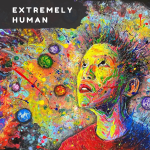
How can we respond to distress with greater compassion and humanity?
Sometimes as humans, we have experiences that aren’t shared or understood by others. Often these experiences can feel extreme, scary, unreal or even euphoric. Experiences like psychosis, depression, grief and addiction.
Here is a little taster of highlights from some of the conversations Lucy and Rachel have had so far with incredible humans who vulnerably share their different perspectives on these ideas.
Come and listen with:
Lucy (She/Her) – A big fan of pickleball, ice cream and storytelling
Rachel (She/Her) – Social Worker, Dialogical Practitioner and wildly passionate about transforming the culture of mental health services to be person-led and human rights informed.
Incredible artwork @sharleencu_art
EPISODE TRANSCRIPT – Extremely Human Trailer
LUCY This podcast has conversations around different mental health experiences that may be distressing for some people. If that doesn’t feel like something you want to explore today, you might wanna visit another podcast and come back to us another time.
RACHEL discovery college acknowledges the traditional owners of country throughout Australia and recognises the continuing connection to lands, waters, and community. We pay our respects to Aboriginal and Torres Strait Islander cultures, and to the elders past and present. They have never ceded sovereignty.
LUCY In this podcast, we share stories that help us learn from each other, connect us, and inspire growth. We want to acknowledge that this way of being, of coming together to share knowledge and stories is a tradition that has already existed on this land for hundreds of thousands of years as a part of the culture of First Nations people.
RACHEL discovery college acknowledges the views shared in these podcasts are about mental health experiences, but are not a substitute for professional mental health advice and support. The views in this podcast are not the views of Alfred Health, but are the views of the individuals we’ve had conversations with.
LUCY The stories we share on this podcast aren’t just stories, but memories of the people who have bravely shared their experiences with us. Remember to take care of yourself as you listen, as well as to take care of the stories that you hear.
MUSIC
RACHEL This podcast series called Extremely Human Looks at the profound experience of extreme states from both personal and outsider perspectives. When we speak about extreme states, we are exploring a more humanistic way to describe and understand people’s experiences that aren’t always shared by others.
LUCY Through sharing stories, we strive to understand and describe the unique journeys that may feel unusual, confusing, distressing, or even wonderful for individuals. Each extreme state holds different meaning for each person, including those related to psychosis, depression, grief, and addiction. As we have conversations with a variety of people, we explore an important question, how can we respond to distress with greater compassion and humanity?
MUSIC
RACHEL The Extremely Human Podcast came about because we started to realize there were many untold stories about extreme states that needed to be heard about what had been helpful to people and what hadn’t.
LUCY We discovered a theme about the importance of compassion and here are some of the snippets of what we heard.
JAMIE The more I was able to spend time with people in extreme states, the more I realized what a naturally human experience it needs to be viewed as in order to be helpful in that space. So as a clinician, I think we spend time around people and we find ourselves wanting to find the on and off switch at times to just help, to change, to fix professionals. Um, in general, and you know, this is without judgment at all, but can see distress as a black and white state. Respond according to the book and apply the theory and the knowledge, the low and slow and the de-escalation. And sometimes de-escalation is not always the best first thing to do. If someone has an experience that needs time to expel itself, to exhaust itself or, or to simply have that distress expressed in a way that they feel they need to in the moment. Then jumping in with de-escalation and you know, tell me how you feel and all that sort of good stuff that has its place. I think sometimes rushing to that approach can be perhaps sometimes missing the human element of, of what’s happening in front of you with someone in distress. You know, how do you be a human first and a professional when it’s required? To me, that’s the order that, um, for my own professional way of working, that to me, that’s what needs to happen is I need to be in the room as a human being with professional skills. But if my skills walk in before I do as a person, I’ve probably lost that person.
GUEST I was hospitalized once in Indonesia and like that was a really interesting experience. ’cause I was literally put behind like rusted metal bars with like a squat toilet in the corner and like a metal bed in the side and a camera watching in the room. Sound like prison, doesn’t it? Yeah. Yeah. That was like prison. And I just think that was very reflective of like the whole idea behind mental health. Like psychiatric wards, it’s like a place to be monitored. Sometimes you can feel like you’re being incarcerated by being in hospital because you’re put on a community treatment order, which means you are like medicated, enforceable by law and you have to be treated and it can feel very restrictive and controlled and enforced, and those only exacerbate the symptoms of psychosis. It’s not the right environment for someone who’s going through something so sensitive and extreme. I think it’s really about like deepening our understanding of the human experience and like allowing the human experience to be whatever it is and not trying to suppress it into something that it’s not.
PAUL Yes, I think there is a problem that in our western culture, I believe that over a period of time, lots of emotional distress or mental distress has become too medicalised and it’s leads to a real narrowing and of being able to help people. And it’s also very, I think it’s part of our culture too, which is very individualistic and, and the responsibility for everything lies within the individual. Um, I think it causes heaps of problems because it’s particularly often leads to unhelpful solutions like that an expert knows best, that drugs are the way to help with these things. Only that there’s some underlying medical problem, which is usually not the case. I think things are improving to some degree. And I think the main issue is trying to involve as many people as possible in decisions like this. In the past what happened to people was a much more secret, much more things against their will without them really understanding why. Um, and also families felt very shut out of those decision-making processes because the medicalisation puts the problem in the person and the responsibility with the expert. Whereas if it’s more shared decision making with people that love the person and the person, I think that even though it doesn’t sound that different, I think it makes a big difference.
CHRISTOPHER I think that for me, I honestly think that like in general, people can do better by being more supportive, by being more open-minded and less judgmental and more curious. Asking questions like, what are you going through? Like I’ve told my family and my friends, if I’m going through stuff to ask me like, first, are you okay? And then if it’s like, yes. And then the second question, are you stressed? If you are listening, like, and you’ve got someone that doesn’t know how to support you, maybe like asking them to ask you those questions. Like, are you okay at, are you stressed? Like, is there any way that I can support you? Do you want me to listen or do you want me to give advice? Yeah, like even that question, do you want me to listen or give advice is really powerful because sometimes you need advice and sometimes you just want someone to listen. So asking me questions about how I’m actually feeling rather than judging me and saying, oh, you seem a bit racy, you seem a bit flat.
RACHEL Well, you can’t be curious if you’re being judgmental. You, it’s, you know, I think dropping judgment allows curiosity.
ELSA I think especially when working with others or talking to others. And when I think about sort of the conversations I’ve had, sometimes you think, oh, why is that person feeling so upset about that? Or like, um, expressing themselves in that way. And I think we do need to remember that there’s so much that might be different and that we are different. We, we are individuals, we will respond differently. Sometimes we, we sort of judge that response that what we experiencing, but what we haven’t understood is the meaning behind it or what’s gone on for that person. Yeah. And I think that is actually sort of quite relevant and we don’t always spend that time asking or understanding. Yeah. And, and I think if we did, then maybe we’d be just as excited or just as upset or whatever. Yeah. And I think there is something about, you know, that sort of understanding or just being with that person and connecting with that person. That’s what’s so important.
MUSIC
LUCY Thank you for listening to our podcast. If you wanted to stay in touch or learn more about discovery college, please head to our website, discovery.college.




